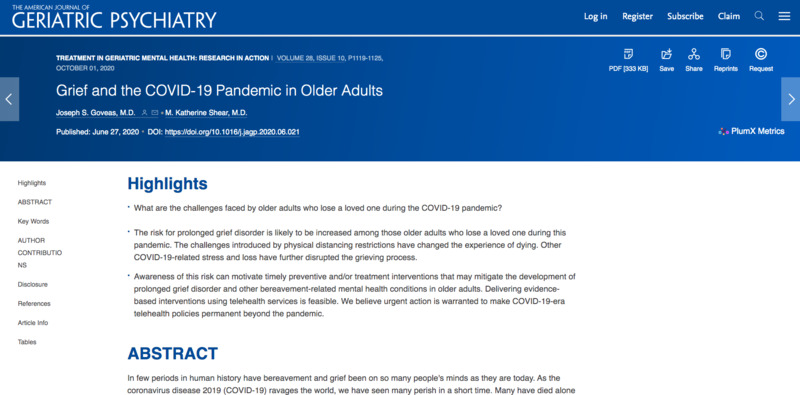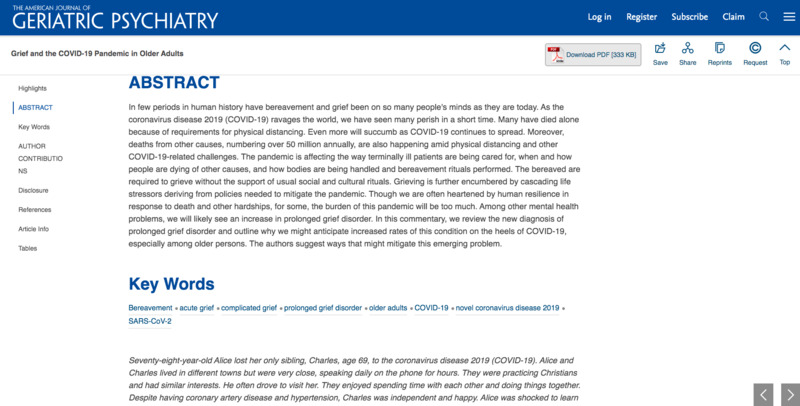Item
The American Journal of Geriatric Psychiatry Examines Covid-19 Grief Among Elderly
Title (Dublin Core)
The American Journal of Geriatric Psychiatry Examines Covid-19 Grief Among Elderly
Description (Dublin Core)
Doctors Joseph S. Goveas and M. Katherine Shear anticipate an increase in prolonged grief disorder after the pandemic. They contend that this will hit older Americans particularly hard. Their research begins with an anecdote about Alice, a 78-year-old woman, who lost her brother Charles, aged 69. The two were very close. According to the article, Alice felt guilty that she could not be with Charles during his moments. After his death, she experienced loss of sleep and weight loss, although it was not severe enough to be categorized as major depression. Below is her story from the article.
“Seventy-eight-year-old Alice lost her only sibling, Charles, age 69, to the coronavirus disease 2019 (COVID-19). Alice and Charles lived in different towns but were very close, speaking daily on the phone for hours. They were practicing Christians and had similar interests. He often drove to visit her. They enjoyed spending time with each other and doing things together. Despite having coronary artery disease and hypertension, Charles was independent and happy. Alice was shocked to learn he had been hospitalized for COVID-19 pneumonia and that he was intubated and on a ventilator. A bereavement coordinator reached out to her, which she very much appreciated. However, Alice declined an offer to visit Charles, frightened of contracting the disease herself. She understood that she, too, was at high risk for dying of COVID-19 because of her age. Although she tried to reach out to him via Skype, Charles died with only the bereavement coordinator and hospital staff at his side. Alice completed the funeral arrangements via Skype. Charles was cremated without her being present, and his ashes were delivered to her. Several weeks after his passing, Alice was plagued by remorse for abandoning her dying brother. She yearned to be with Charles and could not believe he was gone. She fluctuated between numbness, overwhelming sadness, and intense guilt. She could not stop thinking that she failed her brother during his last days. She was having trouble sleeping and was beginning to lose weight but did not meet criteria for major depression. She liked to reminisce about fond memories of Charles and knew he was with God. She had confidence in the religious belief that she would see him again one day. She also knew that she wanted to live and that she would carry Charles in her heart for the rest of her days. She continued to talk with the hospital bereavement coordinator weekly, an important source of solace. They often discussed the details of her plan to hold a memorial service in celebration of Charles’ life after pandemic restrictions are lifted.”
“Seventy-eight-year-old Alice lost her only sibling, Charles, age 69, to the coronavirus disease 2019 (COVID-19). Alice and Charles lived in different towns but were very close, speaking daily on the phone for hours. They were practicing Christians and had similar interests. He often drove to visit her. They enjoyed spending time with each other and doing things together. Despite having coronary artery disease and hypertension, Charles was independent and happy. Alice was shocked to learn he had been hospitalized for COVID-19 pneumonia and that he was intubated and on a ventilator. A bereavement coordinator reached out to her, which she very much appreciated. However, Alice declined an offer to visit Charles, frightened of contracting the disease herself. She understood that she, too, was at high risk for dying of COVID-19 because of her age. Although she tried to reach out to him via Skype, Charles died with only the bereavement coordinator and hospital staff at his side. Alice completed the funeral arrangements via Skype. Charles was cremated without her being present, and his ashes were delivered to her. Several weeks after his passing, Alice was plagued by remorse for abandoning her dying brother. She yearned to be with Charles and could not believe he was gone. She fluctuated between numbness, overwhelming sadness, and intense guilt. She could not stop thinking that she failed her brother during his last days. She was having trouble sleeping and was beginning to lose weight but did not meet criteria for major depression. She liked to reminisce about fond memories of Charles and knew he was with God. She had confidence in the religious belief that she would see him again one day. She also knew that she wanted to live and that she would carry Charles in her heart for the rest of her days. She continued to talk with the hospital bereavement coordinator weekly, an important source of solace. They often discussed the details of her plan to hold a memorial service in celebration of Charles’ life after pandemic restrictions are lifted.”
Date (Dublin Core)
Creator (Dublin Core)
Event Identifier (Dublin Core)
Partner (Dublin Core)
Type (Dublin Core)
This is a journal article from The American Journal of Geriatric Psychiatry (AJGP) that examines the following: how older adults cope with losing a loved one, risks associated with prolonged grief, challenges of social distancing, pandemic-related stress, and using telehealth visits as a preventative measure.
Link (Bibliographic Ontology)
Controlled Vocabulary (Dublin Core)
Curator's Tags (Omeka Classic)
Contributor's Tags (a true folksonomy) (Friend of a Friend)
Date Submitted (Dublin Core)
11/04/2020
Date Modified (Dublin Core)
11/24/2020
01/30/2021
09/25/2022
07/06/2023
This item was submitted on November 4, 2020 by [anonymous user] using the form “Share Your Story” on the site “A Journal of the Plague Year”: https://covid-19archive.org/s/archive
Click here to view the collected data.

